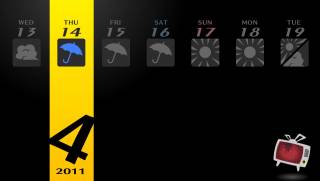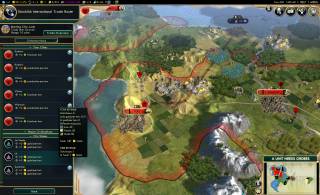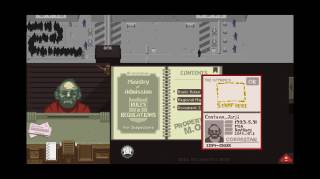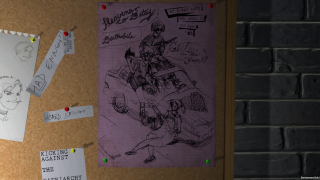Monthly Roundup, August 2013
By majormitch 0 Comments
August turned out to be quite a strong month for games. Between Papers, Please and Gone Home I played a pair of new releases as strong as any one month could hope to muster, and I haven’t even gotten into the meat of Pikmin 3 yet. Not to mention things like Mario & Luigi: Dream Team, Saints Row IV and Splinter Cell: Blacklist, all of which look like decent games, even if I don’t currently have the time and/or desire to play any of them. I did spend the month playing a number of cool games though, including wrapping up a particularly lengthy one.
Persona 4 Golden

I ended last month’s roundup by giving some thoughts on my ongoing personal endurance run of Persona 4 Golden, and I’m happy to start off this month’s by saying that I’ve now finished that lengthy quest. I’ve already said most of what I have to say about it, but I do have a few final closing thoughts to add, as Persona 4 was once again the game I spent the most time playing during the month. First, as the final weeks of the game wound down and I tried to max out as many social links as I possibly could, it further sunk in just how much the game is simply about time. Not only is it a really long game, but it also also requires you to constantly manage that time and complete certain goals within certain time frames. It (and by extension Persona 3) is the rare game that gives you a finite amount of time to work with, and offers more things to do than you can actually accomplish in that time (at least without a very detailed walkthrough). The vast majority of games don’t have such restrictions; you can spend as long as you want collecting every item, doing every quest, and otherwise completing every single thing the game has to do in a single playthrough. It certainly wouldn’t work for every game, but I think the way Persona 4 forces you to make the best use of your time is one of its more interesting aspects.
Otherwise, Persona 4 is about time because, well, it’s a damn long game. My final time clocked in around 97 hours, which is pretty ridiculous. As much as I enjoyed the game overall, I still feel like that’s just too long. I started to feel it after around 70-80 hours in, which made the last portion feel like an unnecessary slog at times. It didn’t help that the game reached it’s natural climax well before the end of the game (for those who have played it, I felt it peaked at the end of December). I didn’t feel like anything after that had much punch, or really added much to the game (that includes the “true” ending, which I did get). When I played Persona 3 a few years ago I remember thinking I would have enjoyed it twice as much had the game been half as long. I would say a similar thing about Persona 4, even if the feeling isn’t nearly as extreme this time. Finally, as one last parting thought, I found Persona 4 to be incredibly easy. I remember a few bosses in Persona 3 being a little tough, but nothing in Persona 4 was the least bit difficult; especially not the bosses. I was somewhat disappointed with that, mainly for the final bosses. Without any challenge they didn’t feel very worthwhile or important, but I guess that’s not the worst thing in the world. At any rate, those minor caveats aside, I did really enjoy Persona 4, and I’m glad I finally got around to playing it.
Civilization V: Brave New World

I don’t have too much to say about Civilization V’s latest expansion, Brave New World, as I’ve talked about Civ V plenty before. But I do feel compelled to mention that between whatever patching has happened over the years and Brave New World’s new tweaks and additions, I think Civ V is currently far and away the best it’s ever been. I’ve played two games of Civ V since getting Brave New World, and they’ve almost certainly been the most fun I’ve had with the game yet. In a way, Brave New World’s specific additions are subtle; things like tourism and ideologies aren’t game changers by any means. But I think where the expansion really shines is in tying together all the different things that Civ V has tried to do over the years, but maybe hasn’t always executed quite as gracefully as it could have. Brave New World feels like that final polish, the thing that turns Civ V into the game it has been trying to be all along. Everything, be it from the main game, God & Kings or Brave New World now feels like it has its place and purpose, enabling a wider variety of viable and enjoyable strategies as a result (diplomacy in particular feels vastly improved). It’s awesome, and I’m looking forward to playing more.
Papers, Please
I’ve had my eye on Papers, Please for quite some time, and fortunately the final game turned out to be every bit as good as I (cautiously) hoped it would be. It’s kind of hard to explain my fascination with this game too, as it simply has you working what should be a dull desk job. The gameplay consists almost entirely of checking the documents (passports, ID cards, entry forms, etc.) of the countless people who want to enter your country through your border checkpoint. Comparing all the information on various papers to make sure everything lines up, thus either clearing them for or denying them entry, may sound really tedious and boring, but there’s a engaging and methodical pace to it that I found pretty mesmerizing. The game also does a great job at starting out very simple, then constantly layering on additional rules to check. This keeps the game feeling consistently fresh, and always kept me on my toes.

If that basic interaction was all Papers, Please offered, it would be a fun, well made and interesting game, if not a very substantial one. What really endears it to me in the long run, however, are the various characters and plot threads that come together to form an overarching narrative as the days play out. Sometimes they’re more personal situations that pop up; a guard may try to bribe you to let his girlfriend through, even though she doesn’t have the right papers, for example. Progressively more common are politically tinged interactions, as your country (Arstotzka) is a fictional “east bloc” communist country in the early 1980s, and there’s all sorts of political and economic tension between you and the neighboring countries. Diplomats and mysterious rebel organizations may try to convince you to approve or deny various key people, or your border checkpoint could come under attack from a terrorist group. The way you handle these situations can change the flow of the narrative in interesting ways, leading to all sorts of different twists and endings. What starts off as a simple game of trying to process as many people as quickly and as accurately as possible eventually turns into a more nuanced and surprisingly dramatic story, and the way you get to participate in that story is fantastic (in fact, it might do "moral choices" better than anything I've played). It also helps that the game is well written, many of the characters are memorable, and the look and sound of the game leaves one hell of an impression. Papers, Please is just an all around awesome game. I highly recommend it.
Gone Home

Games that focus on telling a specific story above all else can be hit or miss for me, but Gone Home is definitely one of the good guys. This is a focused, well executed game that absolutely tells a memorable and affecting story; it knows what it wants to do and pulls it off with aplomb. What really makes it work for me is that I feel like Gone Home lets you participate and explore the story in a fulfilling way. A lot of explicitly story driven games either task you with rote, boring gameplay that feels woefully out of place (often some form of unnecessary combat), or they offer virtually no gameplay at all. Gone Home shuns both approaches, instead setting you loose to explore the house on your own volition in a way that makes sense and feels entirely natural. I found the process highly enjoyable, and I had a great time poking and prodding at every nook and cranny, essentially playing detective as I pieced together the story of this house and its inhabitants. I also appreciate that you can pick up and examine any old object. Even minor things that don’t have any direct connection to the governing story (say, a logo bearing pen or a fictional SNES cartridge) can add a lot of flavor to Gone Home’s version of 1995. There’s an incredible amount of detail to everything in the game, which really brings it to life.
Of course, this all works because Gone Home’s story is as good as it is. The main thread is well written, well voice acted, and is something that will stick with me for quite a while. I also like that, in addition to what’s clearly the game’s main plot thread, there are any number of additional subplots that you can discover and unravel all over the place. It’s neat that these additional threads are just there; you could potentially come across all or none of them, or anywhere in between. The way all of these threads unfold and intertwine with each other is wholly organic as well, painting a satisfying picture regardless of how much of it you actually uncover. In fact, this is perhaps Gone Home’s biggest, yet most subtle strength. The exact way it plays out is dependent on how much, and partially in what order, the player makes their discoveries. Yet no matter what the player does they will still come away with a coherent and (in my eyes) worthwhile experience. Gone Home trusts the player to successfully navigate this large house and its wonderful story on their own, and it’s a welcome and refreshing take on story driven games.
Looking Ahead to September
With August already behind us, I think we’re officially moving into the “holiday” season, a period that seems to get a little bigger every year. My personal outlook for the month starts with Pikmin 3, which I’ve already started playing. I’ve also begun dabbling with Animal Crossing: New Leaf here and there, and may try to dig into some more backlog items if I find time (top prospect: LocoRoco). As for things coming out in September, there’s a quartet of new releases I’m keeping an eye on: Rayman Legends, Total War: Rome II, Puppeteer, and The Wonderful 101. We’ll see how those go; there’s a decent chance I play at least one of them during the month. I should also probably get around to Brothers: A Tale of Two Sons at some point, which hits both Steam and PSN in September. That’s all pretty ambitious as usual, but regardless of how much of that I manage to fit in, it will hopefully be another good month!

0 Comments